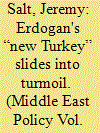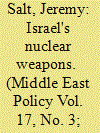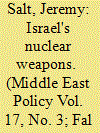| Srl | Item |
| 1 |
ID:
145576


|
|
|
| 2 |
ID:
177519


|
|
|
|
|
| Summary/Abstract |
The author analyzes the final judgment of the UN tribunal convened to inquire into the assassination of former Lebanese Prime Minister Rafiq Hariri. Only one of the four men originally charged was found guilty, wholly on the basis of alleged cell-phone communications. Although Israel was known to have comprehensively penetrated the Lebanese telecommunications sector, the tribunal made no attempt to prove conclusively that the cell-phone calls allegedly made by the accused were actually made by them and not fabricated by a third party. This significant omission undermines the authenticity of the evidence. The tribunal also failed to consider the possible involvement of two governments that have a long history of subversion and violence in Lebanon, the United States and Israel, both totally hostile to Hezbollah and the Syrian government. All of these elements combined raise serious questions about the course of the tribunal's findings from the beginning.
|
|
|
|
|
|
|
|
|
|
|
|
|
|
|
|
| 3 |
ID:
082011


|
|
|
|
|
| Publication |
2008.
|
| Summary/Abstract |
Since 2001 (designated as the UN Year of Dialogue Among Civilisations) several initiatives have been developed as a means of resolving problems whose causes have been ascribed, primarily by Samuel Huntington and Bernard Lewis, to civilisational difference. This article questions responses to the 'clash of civilisations' thesis which seem to accept the postulates on which it is based. It suggests that while dialogue is an indispensable tool of social cohesion, the source of many of the problems that pose a continuing threat to regional and global order is not 'civilisational difference' but the failure of governments to comply with international laws and conventions they have sworn to uphold. The explanation that 'civilisational difference' is the root cause of global disorder allows them to sidestep responsibility for the consequences of their own policies. Manipulation of the United Nations at the level of the Security Council is further evidence that the answer to global problems lies in redressing the failings of an entrenched world system that is based far more on power and state perceptions of self-interest than justice. The clearest evidence of structural weakness in the international system is to be found in the Middle East, where the UN Secretary-General's former special representative to the 'peace process', Alvaro de Soto, has drawn attention to the disjunction between public declarations of good intentions and high-level manipulation of this 'process' by powerful actors from behind the scenes. The article concludes that where dialogue is not the problem, it cannot be the solution
|
|
|
|
|
|
|
|
|
|
|
|
|
|
|
|
| 4 |
ID:
098665


|
|
|
| 5 |
ID:
098711


|
|
|
| 6 |
ID:
163214


|
|
|
| 7 |
ID:
142159


|
|
|
|
|
| Summary/Abstract |
In 1908, the Ottoman Third Army marched from Macedonia to Istanbul and forced the sultan to restore the constitution, introduced in 1876 and suspended in 1878 under the duress of war with Russia. In 1909, chanting crowds of religious students (softas) and turbaned clerics, along with disaffected soldiers, swarmed through the streets of Istanbul, demanding an end to constitutional government and the introduction of sharia law. Revolution had been followed by a counterrevolution, but the army struck back and sent the sultan into exile. Dervis Vahdeti, head of the Muhammadan Society and publisher of the newspaper Volkan (Volcano), was hanged — along with many others — for his central role in instigating the uprising. In 1923, the revolution was consolidated with the establishment of the Turkish Republic. It took shape according to the vision of its founder, Mustafa Kemal “Ataturk,” and thus was modernizing and secular, confining religion to the mosque and the home, and emancipating women. The state was also one-party and authoritarian, driving political Islam and Kurdish identity underground, only for them to rise to the surface again decades later.
|
|
|
|
|
|
|
|
|
|
|
|
|
|
|
|